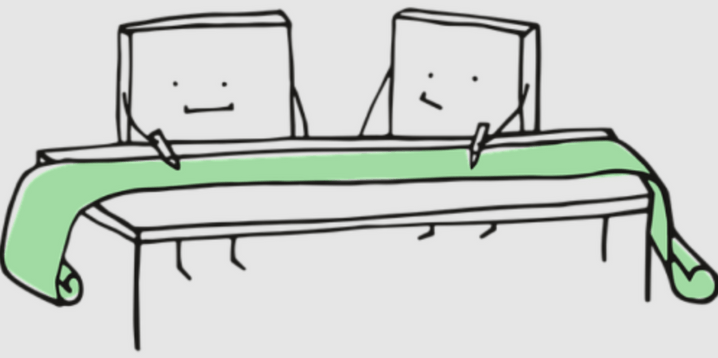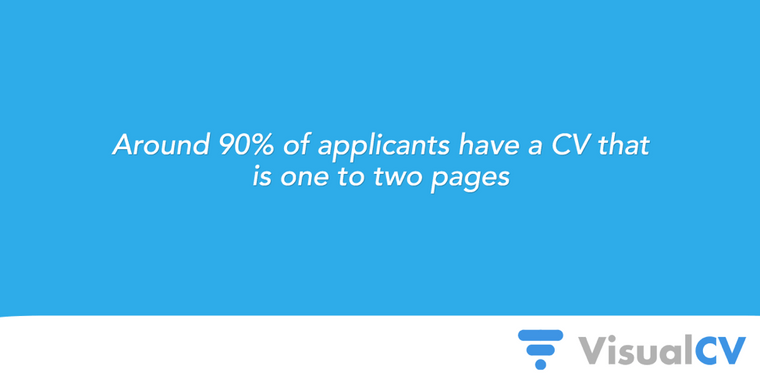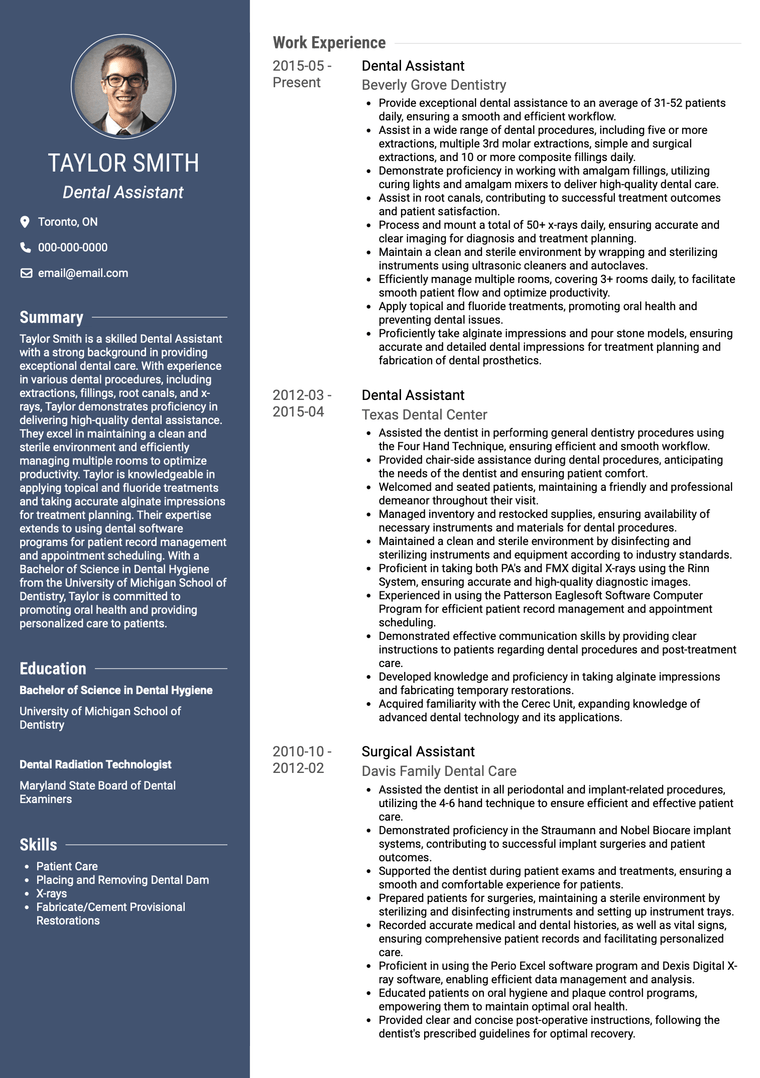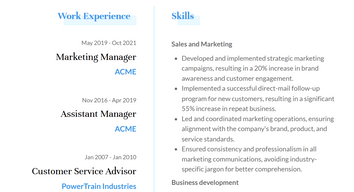
How Long Should a Resume Be in 2025?

Everyone’s resume is unique. Deciding how long your resume should be will depend on your skills, experience, and credentials. A great resume does not have to be long, but it shouldn’t be so short that it leaves out important information, either. With the right strategy, you can craft your resume to the exact right length for your next application.
How long should a resume be?
In most cases, your resume should be one or two pages long.
Some job-seekers mistakenly believe that a resume should never exceed one page, but this is no longer the case. In the typewriter era, when most people spent their careers in just one or two long-term positions, it was easier to keep a resume this short. Nowadays, however, people may change jobs a dozen times or more throughout their career. More positions means more accomplishments and more certifications, and effectively keeping everything to a single page becomes more challenging.
This does not mean, however, that your resume should spread to four to five pages. Recruiters are mostly interested in the most recent ten years of your career, and they are not likely to read more than two or three pages of a resume, no matter how good it is. Research has shown that recruiters spend an astonishingly short average of just six seconds assessing each resume that crosses their desk, so it’s important to make sure that the most important information is near the top and that employers don’t have to sort through too many pages.
In short, your resume should be no longer than it needs to be. For most job-seekers, this will be one or two pages. Don’t make your resume so short that you are leaving out important information, but don’t let it become bloated and boring, either. Keep in mind, however, that the exact length of your resume will depend on your career and your level of experience.

How many pages should my resume be?
When you write a job application, it is important to remember that the recruiters reviewing your resume are humans with human attention spans. Anyone tasked with sorting through hundreds of resumes is going to lose their concentration every now and then. To ensure that your resume gets the attention it deserves, try to keep it as short as you can without leaving out any important details. You don’t want the recruiter to drift off before they get to the end.
The exact length of your resume will depend on several factors, including your experience, the industry, the specific job you are applying for, and how far into your career you are. Further, your resume will not necessarily be the same length for every application, as you should customize your resume for each job application. Most job-seekers use a resume that is one or two pages long, but there are cases where a three or more page resume is acceptable.
How Long Should my Resume Be: One Page
There is no hard and fast rule that your resume must be restricted to a single page, but many job-seekers prefer this length. A one page resume will work best for you if:
- You are a student or recent graduate: Whether you are looking for work after graduating from high school or are still in college and looking for a summer job, you are relatively new to the workforce and may have more limited experience to showcase. Though there are plenty of things that you can show on your resume, such as school projects, volunteer work, and relevant courses or extracurriculars, you should be able to fit it all on one page.
- You have less than five years of work experience: Hiring managers for entry-level positions generally do not require lengthy resumes. If you have been working for fewer than five years, and you are applying for a position that is similar to the one you currently hold, your resume does not need to be longer than one page. At this early stage in your career, it should be easy enough to fit your resume to a single page without losing any relevant details.
- You are transitioning to a new career: If you are taking a new career path that isn’t related to your previous work experience, then keep your resume to one page. For instance, if you have worked as a clerk for three years and are now applying for a job as a waiter, your clerical experience isn’t directly related to your new career. In cases like this, consider writing a one-page Functional or Combination resume that showcases your most relevant skills.
How Long Should my Resume Be: Two Pages
In the past, the rule of thumb was that a resume should not exceed one page. In recent years, as job-hopping, freelancing, and online applications have become more common, two-page resumes have risen in popularity. Consider a two-page resume if:
- You have more than five years of work experience: With five years of experience you may find it difficult to restrict your resume to a single page. If you have been working for five years or more, gaining seniority and certifications along the way, then it is appropriate for your resume to extend to two pages.
- You are (or were) an outstanding student: If you have too many relevant awards, honors, projects, or volunteering experiences to fit on just one page, then two pages is acceptable.
- Your resume can’t quite fit on one page: If your resume is one and a half pages long and you can’t make it any shorter, you may want to fill it out so that it fills the second page more fully. You shouldn’t include irrelevant details, but a full second page looks better than a blank space. The content of your resume is the most important part, but appearances matter too.
How Long Should my Resume Be: Three + Pages
Resumes longer than two pages are rare, but there are circumstances where they can be useful. Consider a three-page resume if:
- You have more than a decade of experience: If you are an experienced professional with many different important positions, promotions, certifications, and memberships to show on your resume, it may be difficult to fit it all on two pages. In cases like this, a three-page resume may be necessary to create the most effective resume possible.
- You are employed by or applying for a job with the government: Governmental departments tend to have strict requirements for all applicants. Include all information that is required by the job posting, even if it pushes your resume over two pages.
- Your profession requires a CV instead of a resume: CVs and resumes are not the same thing, but it is important to note that a CV is usually longer than a resume. If you are a researcher, doctor, or professor, or another profession that requires many certificates and licenses, you may need to write a CV instead of a resume. A CV can be as long as it needs to be in order to cover all of your experience.
How to trim your resume
If you have written your resume and found that it is exceeding your desired number of pages, there are a few ways to cut it down to size.
- Change the template: Your resume may be too long because it has too much white space or other design elements. If this is the case, try working with a different resume template. A two-column resume, for example, is a great way to save space on your resume.
- Edit your resume for relevance: Have you included content that is of no interest to this specific employer? Your resume should be customized for each specific job. Focus on the job description, and exclude any information that won’t help your application. Try to focus on achievements rather than responsibilities, and keep your job descriptions brief.
- Change the formatting of your resume: You may be able to shorten your resume with some simple formatting changes. With VisualCV's free resume builder, you can decrease the font size of your resume, reduce the size of margins, and move sections in order to save space.
How long should a resume summary be?
A resume summary should be short. A great Summary in a resume does not need to be more than a few sentences or paragraphs.
In a resume, the summary section is your introduction to an employer. It is where you can list some of your key skills, accomplishments, or credentials, right at the top of your resume. These highlights should be highly curated and specific to the job you are applying for. This means that your resume summary should only be as long as it needs to be to convince the hiring manager to read the rest of your resume.

How long should a professional resume be?
If you are an experienced professional, you will likely want a two-page resume. This is the typical resume length for a mid-career professional. You should be able to condense your experience in an effective way, showcasing your skills and selling yourself efficiently.
How long should a college resume be?
If you are a student or recent graduate, you may feel that you don't have enough experience for a full two-page resume. That's not a problem. You should still be able to fill out a one-page resume, even if you don't have experience.
If you are writing a resume as a college student without experience, you may struggle to fill out even a single page. If this is the case for you, simply focus on your skills and academic experience. As a college student, you should now be familiar with certain tools, concepts, and abilities that will help you succeed in your career. Fill out your resume with the coursework, specializations, projects, or extracurriculars that are relevant to the job you are applying for.
This way, you should be able to create a one-page, entry-level resume that will land you a great job.
How long should a high school resume be?
Your high school resume only needs to be one page long.
A high school resume will necessarily be on the short side. If you are still in high school, you can't have had very much work experience, unless you got started very young. As such, one page is long enough for a resume.
To fill out your one page high school resume, remember that anything can be experience. You don't need to leave your resume blank just because you haven't held formal employment. For your first resume, feel free to list your informal jobs from around the neighborhood, like mowing lawns, babysitting, or raking leaves. You can also include your involvement in school clubs, your volunteering experience, and your extracurriculars. With all this experience, you should be able to fill out your resume.
One page resume example


Written By
Ben Temple
Community Success Manager & CV Writing Expert
Ben is a writer, customer success manager and CV writing expert with over 5 years of experience helping job-seekers create their best careers. He believes in the importance of a great resume summary and the power of coffee.

Read our free guide to the best action words to use on your resume.
November 23, 2021
Read Post

Co-Founder & Director

Your resume font says something about you. Make sure your resume is stylish and professional with the right font.
May 20, 2022
Read Post

VP Marketing & Resume Expert

If you want to highlight your skills in a resume with a reverse-chronological Work Experience section, a hybrid resume might work for you.
December 11, 2023
Read Post

Community Success Manager & CV Writing Expert
Copyright ©2025 Workstory Inc.